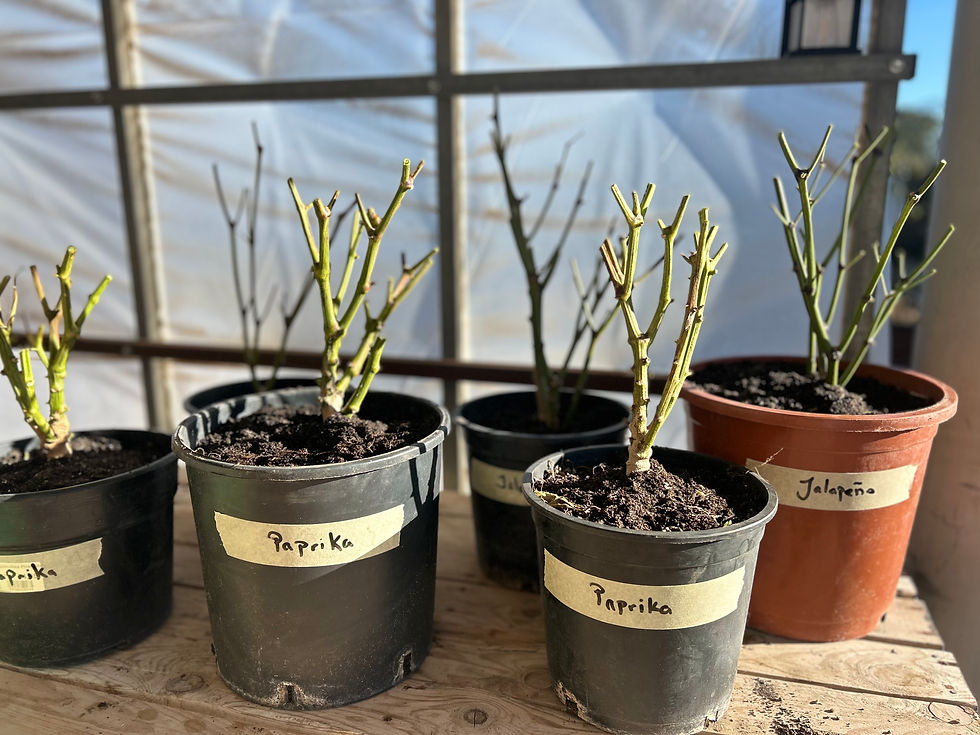Starting Tomato Seeds Indoors in March: A Guide to a Bountiful Harvest
- ourspanishfarm
- Mar 4
- 3 min read
March is the perfect time to start sowing tomato seeds indoors, especially if you want a strong, healthy crop ready for transplanting when the weather warms up. By giving your tomatoes a head start, you ensure a longer growing season, stronger plants, and a more abundant harvest.
Whether you’re a seasoned gardener or a beginner, this guide will help you get your tomato plants off to the best possible start.

Why Start Tomato Seeds Indoors?
Tomatoes are a warm-weather crop, and in many climates, the growing season isn’t long enough to plant seeds directly in the garden and expect a full harvest. By starting seeds indoors in March, you give your plants the time they need to grow strong before moving them outside.
Starting indoors also allows you to:
✅ Choose from a wider variety of tomato types (heirlooms, cherry, beefsteak, etc.)
✅ Save money compared to buying nursery plants
✅ Have control over the growing conditions from the start
What You Need to Start Tomato Seeds Indoors
1. Tomato Seeds
Select the varieties you want to grow. If you’re unsure, consider a mix of cherry, plum, and slicing tomatoes for variety.
2. Seed Trays or Containers
Use seed trays, small pots, or even repurposed containers with drainage holes.
3. High-Quality Seed-Starting Mix
A light, well-draining soil mix helps seeds germinate properly. Avoid regular garden soil, which may be too heavy and contain pests or diseases.
4. Grow Lights or a Sunny Window
Tomatoes need plenty of light—about 12-16 hours per day. If you don’t have a sunny window, use fluorescent or LED grow lights.
5. Warmth for Germination
Tomato seeds germinate best at 21-27°C (70-80°F). Use a heat mat or place them in a warm spot.
6. Spray Bottle or Watering Can
A gentle watering method keeps the soil moist without washing away the seeds.
Step-by-Step Guide to Sowing Tomato Seeds
Step 1: Prepare Your Containers
Fill your seed trays or small pots with moistened seed-starting mix, leaving about 1 cm (½ inch) of space at the top.
Step 2: Plant the Seeds
Plant seeds about 0.5 cm (¼ inch) deep. You can place 2-3 seeds per cell or small pot to ensure germination.
Step 3: Water Gently
Use a spray bottle or a gentle watering can to moisten the soil. Avoid overwatering.
Step 4: Provide Warmth and Cover
Place the containers in a warm spot or on a heat mat. Cover with plastic wrap or a humidity dome to retain moisture.
Step 5: Provide Light
Once seedlings emerge (usually within 5-10 days), remove the cover and place them under grow lights or near a bright window. Rotate plants if they lean toward the light.
Step 6: Thin Out Seedlings
Once the seedlings have two sets of true leaves, thin them by snipping the weaker ones, leaving the strongest plant in each pot.
Step 7: Water and Feed
Keep the soil moist but not soggy. After 3-4 weeks, start feeding with a diluted liquid fertilizer every two weeks.

Preparing for Transplanting
1. Harden Off Your Plants
Before moving them outdoors, gradually expose seedlings to outdoor conditions over 7-10 days. Start with a few hours in a sheltered spot and increase daily.
2. Choose the Right Planting Spot
Tomatoes need at least 6-8 hours of direct sunlight daily. Ensure well-draining, nutrient-rich soil.
3. Transplant Carefully
Plant deeply, burying the stem up to the first set of leaves to encourage strong root growth.
Final Tips for Success
🌱 Label your seeds to keep track of different varieties.
🌱 Avoid overwatering—soggy soil can cause damping off.
🌱 Be patient—tomato plants take time to establish but will reward you with delicious fruit!
By starting your tomato seeds indoors in March, you’re setting yourself up for a thriving garden and a delicious summer harvest. Happy growing!
Would you like to add any personal anecdotes or regional considerations to this post? 😊



What kinds of tomatoes are you planting?